Fleurs du Mal Magazine


Or see the index
Großes Humboldt-Gedenken 2018/2019: bibliophiler Prachtband.
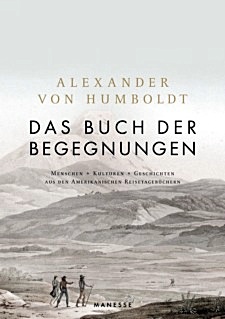 Wagemut und Wissbegier, ein feines Beobachtungs- und Differenzierungsvermögen und vor allem die unbändige Lust an immer neuen Begegnungen machten Alexander von Humboldt vor 200 Jahren zu einem epochalen Weltentdecker.
Wagemut und Wissbegier, ein feines Beobachtungs- und Differenzierungsvermögen und vor allem die unbändige Lust an immer neuen Begegnungen machten Alexander von Humboldt vor 200 Jahren zu einem epochalen Weltentdecker.
«Das Buch der Begegnungen», das die emphatischsten Zeugnisse aus den «Amerikanischen Reisetagebüchern» versammelt, zeigt einen warmherzigen Menschen ohne Berührungsängste. Auf seiner Reise in die amerikanischen Tropen von 1799 bis 1804 hielt der preußische Kosmopolit eine Vielzahl exotischer Physiognomien fest und sah die Welt, wie sie vor ihm noch keiner gesehen hatte. Als einer der ersten Europäer überhaupt kritisierte er Kolonialismus, Sklavenhandel und christlichen Bekehrungseifer.
Dagegen betonte er die Würde und den kulturellen Reichtum vermeintlich primitiver Völker. Überzeugt davon, dass es keine unterlegenen oder gar minderwertigen Ethnien gebe, war er seinen Zeitgenossen weit voraus. Und selbst im 21. Jahrhundert kommt Alexander von Humboldt als Anwalt einer universellen Humanität wie gerufen.
Bibliophiler Prachtband: gebunden in bedrucktes Leinen, zweifarbig gedruckt, fadengeheftet, mit farblich abgestimmtem Lesebändchen, gestaltetem Vorsatz sowie Originalillustrationen Alexander von Humboldts.
Ottmar Ette ist Professor für Romanistik an der Universität Potsdam und gehört zu den führenden Experten zu Humboldts Werk. Er leitete das Forschungsprojekt zur Auswertung von Humboldts Amerikanischen Reisetagebüchern.
Alexander von Humboldt (1769–1759), deutscher Universalgelehrter und Expeditionsreisender von internationalem Renommee, machte als Pionier diverser naturwissenschaftlicher Fachdisziplinen von sich reden: von der Botanik und Zoologie über die Klimatologie bis hin zur Astronomie. Seit seiner Amerikanischen Forschungsreise 1799-1804 gilt er als «wissenschaftlicher Wiederentdecker Amerikas» und Mitbegründer der empirisch fundierten Geographie. Doch auch als Ethnologe, Kulturtheoretiker und couragierter Humanist war er seiner Mitwelt weit voraus.
Alexander von Humboldt, Ottmar Ette (Hrsg.)
Das Buch der Begegnungen
Menschen – Kulturen – Geschichten aus den Amerikanischen Reisetagebüchern
Gebundenes Buch, Leinen,
416 Seiten,
17,0 x 24,0 cm
mit ca. 10 Abb.
ISBN: 978-3-7175-2444-1
€ 45,00
Verlag: Manesse
Erscheinungstermin: 25. Juni 2018
new books
fleursdumal.nl magazine
More in: - Book Lovers, - Book Stories, Archive G-H, Department of Birds of Prey, Illustrators, Illustration, Natural history
A Latina feminist State of the Union address at the intersection of pop culture and interiority.
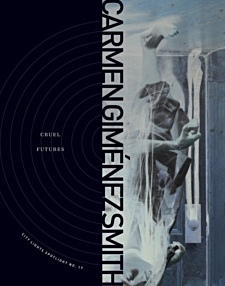 Cruel Futures is a witchy confessional and wildly imagistic volume that examines subjects as divergent as Alzheimers, Medusa, mumblecore, and mental illness in sharp-witted, taut poems dense with song. Chronicling life on an endangered planet, in a country on the precipice of profound change compelled by a media machine that produces our realities, the book is a high-energy analysis of popular culture, as well as an exploration of the many social roles that women occupy as mother, daughter, lover, and the resulting struggle to maintain personhood—all in a late capitalist America.
Cruel Futures is a witchy confessional and wildly imagistic volume that examines subjects as divergent as Alzheimers, Medusa, mumblecore, and mental illness in sharp-witted, taut poems dense with song. Chronicling life on an endangered planet, in a country on the precipice of profound change compelled by a media machine that produces our realities, the book is a high-energy analysis of popular culture, as well as an exploration of the many social roles that women occupy as mother, daughter, lover, and the resulting struggle to maintain personhood—all in a late capitalist America.
Born in New York, poet Carmen Giménez Smith earned a BA in English from San Jose State University and an MFA in creative writing from the University of Iowa. She writes lyric essays as well as poetry, and is the author of the poetry chapbook Casanova Variations (2009); the memoir Bring Down the Little Birds: On Mothering, Art, Work, and Everything Else (2010); and the full-length collections Odalisque in Pieces (2009), Milk and Filth (2013), finalist for the National Book Critics Circle Award, and Cruel Futures: City Lights Spotlight No. 17 (City Lights Publishers, 2018).
Giménez Smith’s work explores issues affecting the lives of females, including Latina identity, and frequently references myth and memory. With the publication of Odalisque in Pieces, Giménez Smith was featured as a New American Poet on the Poetry Society of America’s website. Her poems have been included in the anthologies Floricanto Si! U.S. Latina Poets (1998) and Contextos: Poemas (1994).
Giménez Smith is the editor-in-chief of Puerto del Sol and publisher of Noemi Press. She was appointed as poetry co-editor (along with Steph Burt) at The Nation in 2017 and teaches at Virginia Tech University.
Title Cruel Futures
Author Carmen Giménez Smith
Collection City Lights Spotlight
Publisher City Lights Publishers
Format Paperback
ISBN-10 0872867587
ISBN-13 9780872867581
Publication Date 15 April 2018
Main content page count 88
List Price $15.95
new books
fleursdumal.nl magazine
More in: - Book News, - Book Stories, Archive G-H, Art & Literature News, Opium-Eaters, Psychiatric hospitals
Hij kijkt uit over het water en de weilanden. Op de parkeerplaats zijn een paar caravans gearriveerd. En opleggers met kermismateriaal.
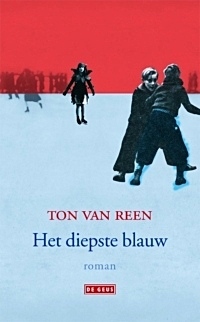 Een hydraulische kraan zet het onderstuk van de vliegende schotel neer. In een paar minuten krijgt het ding al vorm. Tonnetjes die rondtollen en ook nog eens rond de as van de schotel vliegen.
Een hydraulische kraan zet het onderstuk van de vliegende schotel neer. In een paar minuten krijgt het ding al vorm. Tonnetjes die rondtollen en ook nog eens rond de as van de schotel vliegen.
Hij is jaloers op de jongelui die met bloot bovenlijf aan het werk zijn. Gespierde kerels. Net zoals hij zelf vroeger was. Hij hoopt dat ze sterk blijven. Niet aftakelen. Niemand heeft de straf van een onwillig lichaam verdiend.
Kon hij nog maar eens één keer de Wijer afvaren. Roeiend. De benen stevig geplant tegen de schotten.
Ton van Reen: Het diepste blauw (064)
wordt vervolgd
fleursdumal.nl magazine
More in: - Book Stories, - Het diepste blauw, Archive Q-R, Reen, Ton van
The first critical edition of the complete poems of Basil Bunting (1900 – 1985), published on the fiftieth anniversary of his masterpiece, Briggflatts.
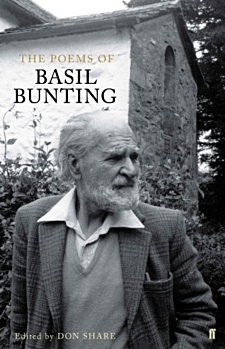 Basil Bunting is one of the most important British poets of the twentieth century, admired early on by Ezra Pound and Louis Zukofsky, and acknowledged since the 1930s as a major figure in the Modernist movement. Faber published a selection of his early work in Pound’sActive Anthology (1933), but Bunting’s reputation was not confirmed until decades later with the publication of his masterpiece, Briggflatts, by Fulcrum Press in 1966.
Basil Bunting is one of the most important British poets of the twentieth century, admired early on by Ezra Pound and Louis Zukofsky, and acknowledged since the 1930s as a major figure in the Modernist movement. Faber published a selection of his early work in Pound’sActive Anthology (1933), but Bunting’s reputation was not confirmed until decades later with the publication of his masterpiece, Briggflatts, by Fulcrum Press in 1966.
Bunting’s work was published throughout most of his life in editions from Oxford University Press, Bloodaxe Books, New Directions and various small presses. This is the first critical edition of the complete poems, and offers an accurate text with variants from all printed sources. Don Share annotates Bunting’s often complex and allusive verse, with much illuminating quotation from his prose writings, interviews and correspondence. He also examines Bunting’s sources (including Persian literature and classical mythology), and explores the Northumbrian roots of Bunting’s poetic vocabulary and use of dialect.
This important work of literary scholarship offers, for the first time, an edition commensurate with the achievement of this neglected Modernist master.
(…)
Night, float us.
Offshore wind, shout,
ask the sea
what’s lost, what’s left,
what horn sunk,
what crown adrift.
(Fragment from: Coda by Basil Bunting)
The first critical edition of the complete poems of Basil Bunting, published on the fiftieth anniversary of his masterpiece, Briggflatts. Basil Bunting is one of the most important British poets of the twentieth century, admired early on by Ezra Pound and Louis Zukofsky, and acknowledged since the 1930s as a major figure in the Modernist movement.
Faber published a selection of his early work in Pound’sActive Anthology (1933), but Bunting’s reputation was not confirmed until decades later with the publication of his masterpiece, Briggflatts, by Fulcrum Press in 1966. Bunting’s work was published throughout most of his life in editions from Oxford University Press, Bloodaxe Books, New Directions and various small presses.
This first critical edition of the complete poems offers an accurate text with variants from all printed sources. Don Share annotates Bunting’s often complex and allusive verse, with much illuminating quotation from his prose writings, interviews and correspondence. He also examines Bunting’s sources (including Persian literature and classical mythology), and explores the Northumbrian roots of Bunting’s poetic vocabulary and use of dialect.
This important work of literary scholarship offers, for the first time, an edition commensurate with the achievement of this neglected Modernist master.
The Poems of Basil Bunting
Basil Bunting
Hardcover
624 pages
Publisher: Faber & Faber
Main edition (2016)
Language: English
ISBN-10: 057123500X
ISBN-13: 978-0571235001
£30.00
Books That Everyone Should Read
fleursdumal.nl magazine
More in: - Book Stories, Archive A-B, EDITOR'S CHOICE
Osip Mandelstam visited Armenia in 1930, and during the eight months of his stay, he rediscovered his poetic voice and was inspired to write an experimental meditation on the country and its ancient culture.
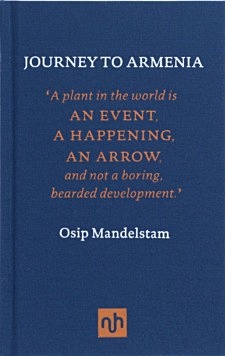 This edition also includes the companion piece, “Conversation About Dante,” which Seamus Heaney called “Osip Mandelstam’s astonishing fantasia on poetic creation.” An incomparable apologia for poetic freedom and a challenge to the Bolshevik establishment, the essay was dictated by the poet to his wife, Nadezhda Mandelstam, in 1934 and 1935, during the last phase of his itinerant life. It has close ties to the Journey to Armenia.
This edition also includes the companion piece, “Conversation About Dante,” which Seamus Heaney called “Osip Mandelstam’s astonishing fantasia on poetic creation.” An incomparable apologia for poetic freedom and a challenge to the Bolshevik establishment, the essay was dictated by the poet to his wife, Nadezhda Mandelstam, in 1934 and 1935, during the last phase of his itinerant life. It has close ties to the Journey to Armenia.
Osip Mandelstam (1891–1938) was born and raised in St. Petersburg, where he attended the prestigious Tenishev School, before studying at the universities of St. Petersburg and Heidelberg and at the Sorbonne.
Mandelstam first published his poems in Apollyon, an avant-garde magazine, in 1910, then banded together with Anna Akhmatova and Nicholas Gumilev to form the Acmeist group, which advocated an aesthetic of exact description and chiseled form, as suggested by the title of Mandelstam’s first book, Stone (1913). During the Russian Revolution, Mandelstam left Leningrad for the Crimea and Georgia, and he settled in Moscow in 1922, where his second collection of poems, Tristia, appeared.
Unpopular with the Soviet authorities, Mandelstam found it increasingly difficult to publish his poetry, though an edition of collected poems did come out in 1928. In 1934, after reading an epigram denouncing Stalin to friends, Mandelstam was arrested and sent into exile. He wrote furiously during these years, and his wife, Nadezhda, memorized his work in case his notebooks were destroyed or lost. (Nadezhda Mandelstam’s extraordinary memoirs of life with her husband, Hope Against Hope and Hope Abandoned, published in the 1970s, later helped to bring Mandelstam a worldwide audience.
Journey to Armenia by Osip Mandelstam,
introduction by Henry Gifford,
translated from the Russian by Sydney Monas, Clarence Brown, and Robert Hughes
Series: Notting Hill Editions
ISBN: 9781907903472
Pages: 192
Publication Date in Hardcover:
September 25, 2018
new books
fleursdumal.nl magazine
More in: - Book News, - Book Stories, Archive M-N, Art & Literature News, Mandelstam, Osip, REPRESSION OF WRITERS, JOURNALISTS & ARTISTS
Bettina Röhl über ihre letzten gemeinsamen Jahre mit ihrer Mutter Ulrike Meinhof
 Brauchte die Bundesrepublik die Revolte von 68? Ist 68 gar das Jahr einer „Neugründung“ der heutigen Bundesrepublik? Die APO-Bewegung – und ihre „Speerspitze“, die RAF – ist das wohl meist beschriebene Thema der neueren politischen Geschichte des Landes. Mit bisher unbekannten Fakten und den Stimmen neuer Zeitzeugen unterlegt, liefert Bettina Röhl, die als Kind die Gründung der RAF hautnah miterlebte, eine spannende Analyse und erzählt die scheinbar bekannte Geschichte neu. Bei ihren Recherchen fand Bettina Röhl zahlreiche bisher unveröffentlichte Briefe, Dokumente und Fotos, die den Leser die damalige Zeit hautnah miterleben und nachvollziehen lassen.
Brauchte die Bundesrepublik die Revolte von 68? Ist 68 gar das Jahr einer „Neugründung“ der heutigen Bundesrepublik? Die APO-Bewegung – und ihre „Speerspitze“, die RAF – ist das wohl meist beschriebene Thema der neueren politischen Geschichte des Landes. Mit bisher unbekannten Fakten und den Stimmen neuer Zeitzeugen unterlegt, liefert Bettina Röhl, die als Kind die Gründung der RAF hautnah miterlebte, eine spannende Analyse und erzählt die scheinbar bekannte Geschichte neu. Bei ihren Recherchen fand Bettina Röhl zahlreiche bisher unveröffentlichte Briefe, Dokumente und Fotos, die den Leser die damalige Zeit hautnah miterleben und nachvollziehen lassen.
Bettina Röhl wurde 1962 in Hamburg geboren, wo sie 1982 Abitur machte. 1986 begann sie neben ihrem Studium der Geschichte und Germanistik ihr Volontariat bei der Zeitschrift TEMPO. Sie arbeitete für Spiegel TV, Welt online, Cicero, Wirtschaftswoche und viele andere Medien und veröffentlichte zahlreiche Buchbeiträge. 2001 wurde sie mit ihren Veröffentlichungen zu Joschka Fischers Gewaltvergangenheit in stern und BILD bekannt. Nach „So macht Kommunismus Spaß“ ist „Die RAF hat euch lieb“ ihr zweites historisch-biographisches Buch über die linke Geschichte der Bundesrepublik.
Bettina Röhl
„Die RAF hat euch lieb“
Die Bundesrepublik im Rausch von 68
Eine Familie im Zentrum der Bewegung
Gebundenes Buch mit Schutzumschlag,
640 Seiten,
13,5 x 21,5 cm mit 16 S. Bildteil
ISBN: 978-3-453-20150-7
€ 24,00
Verlag: Heyne Verlag
Erschienen: 10.04.2018
Sprache: Deutsch
new books
fleursdumal.nl magazine
More in: - Book News, - Book Stories, Archive Q-R, Art & Literature News, BIOGRAPHY, Galerie Deutschland, Protests of MAY 1968, Spurensicherung
Thriller with film rights sold to the creators of The Girl On the Train.
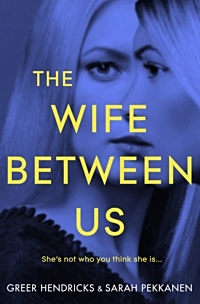 This one will keep you guessing.’ – Anita Shreve, author of The Stars are Fire When you read this book, you will make many assumptions. It’s about a jealous wife, obsessed with her replacement. It’s about a younger woman set to marry the man she loves.
This one will keep you guessing.’ – Anita Shreve, author of The Stars are Fire When you read this book, you will make many assumptions. It’s about a jealous wife, obsessed with her replacement. It’s about a younger woman set to marry the man she loves.
The first wife seems like a disaster; her replacement is the perfect woman. You will assume you know the motives, the history, the anatomy of the relationships. You will be wrong. The Wife Between Us is the first collaboration between Greer Hendricks and Sarah Pekkanen.
Greer Hendricks spent over two decades as an editor. Prior to her tenure in book publishing, she worked at Allure Magazine and earned her Masters in Journalism from Columbia University. Her writing has been published in the New York Times and Publishers Weekly. Greer lives in Manhattan with her husband, two children, and very needy dog, Rocky. The Wife Between Us is her first novel.
Sarah Pekkanen is the internationally and USA Today bestselling author of several novels including Skipping a Beat. A former investigative journalist and feature writer, her work has been published in The Washington Post, USA Today, and many others. She is the mother of three sons and lives just outside Washington, D.C.
Greer Hendricks & Sarah Pekkanen
The Wife Between Us
Trade Paperback
Publ Date: July 26, 2018
Category: Fiction / Thriller
Publisher: Pan Books / Macmillan
Pages: 352
Language: English
ISBN-10: 1509842837
ISBN-13: 978-1509842834
new books
fleursdumal.nl magazine
More in: - Book News, - Bookstores, Archive G-H, Archive O-P, Art & Literature News, Thrillers
In this book, Gerald Janecek provides a comprehensive account of Moscow Conceptualist poetry and performance, arguably the most important development in the arts of the late Soviet period and yet one underappreciated in the West.
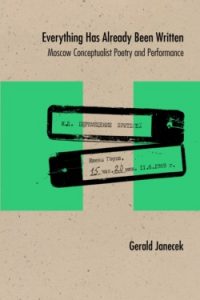 Such innovative poets as Vsevolod Nekrasov, Lev Rubinstein, and Dmitry Prigov are among the most prominent literary figures of Russia in the 1980s and 1990s, yet they are virtually unknown outside Russia. The same is true of the numerous active Russian performance art groups, especially the pioneering Collective Actions group, led by the brilliantly inventive Andrey Monastyrsky.
Such innovative poets as Vsevolod Nekrasov, Lev Rubinstein, and Dmitry Prigov are among the most prominent literary figures of Russia in the 1980s and 1990s, yet they are virtually unknown outside Russia. The same is true of the numerous active Russian performance art groups, especially the pioneering Collective Actions group, led by the brilliantly inventive Andrey Monastyrsky.
Everything Has Already Been Written strives to make Moscow Conceptualism more accessible, to break the language barrier and to foster understanding among an international readership by thoroughly discussing a broad range of specific works and theories. Janecek’s study is the first comprehensive analysis of Moscow Conceptualist poetry and theory, vital for an understanding of Russian culture in the post-Conceptualist era.
Gerald Janecek is professor emeritus of Russian and Eastern Studies at the University of Kentucky. He is the author of The Look of Russian Literature: Avant-Garde Visual Experiments, 1900-1930; ZAUM: The Transrational Poetry of Russian Futurism; and Sight and Sound Entwined: Studies of the New Russian Poetry.
Gerald Janecek (Author)
Everything Has Already Been Written
Moscow Conceptualist Poetry and Performance
Paper Text – $39.95
ISBN 978-0-8101-3901-5
Cloth Text – $120.00
ISBN 978-0-8101-3902-2
Publication Date: December 2018
Series: Studies in Russian Literature and Theory
Literature & Criticism
Russia Drama & Performance Studies
Page Count 312 pages
Northwestern University Press
new books
fleursdumal.nl magazine
More in: #More Poetry Archives, - Book News, - Bookstores, Archive I-J, Art & Literature News, Conceptual writing, EXPERIMENTAL POETRY, Performing arts, Visual & Concrete Poetry
Na school wacht hij een tijdje op Tijger en Thija, maar dan ziet hij Thija achter het raam van de klas bezig met de bloemen. Samen met juf Elsbeth. En Tijger?
 Waarschijnlijk is hij al naar huis, zijn moeder helpen met het witten van de keukenmuren, het houtwerk schuren en dat soort dingen. Elk jaar krijgt zijn moeder een aanval van vernieuwingsdrift. Dan moet alles nieuw in de verf en in de kalk. Tijger slikt het maar. Hij weet dat hij die paar weken moet overleven om weer een heel jaar vrij te zijn.
Waarschijnlijk is hij al naar huis, zijn moeder helpen met het witten van de keukenmuren, het houtwerk schuren en dat soort dingen. Elk jaar krijgt zijn moeder een aanval van vernieuwingsdrift. Dan moet alles nieuw in de verf en in de kalk. Tijger slikt het maar. Hij weet dat hij die paar weken moet overleven om weer een heel jaar vrij te zijn.
Er is niemand thuis. Mels drinkt een glas karnemelk en besluit om naar juffrouw Fijnhout te gaan om de ramen te lappen.
De winkelbel gaat over als hij naar binnen gaat.
`Kom je me helpen, Mels?’ Juffrouw Fijnhout loopt met hem mee naar de keuken en pakt spons en zeem uit het aanrechtkastje. Ze vertelt dat ze naar de dokter is geweest omdat ze de laatste tijd soms draaierig is en omdat haar huid verkleurt. Mels ziet het. Ze wordt geel en ze is een beetje doorschijnend, vooral als ze onder de lamp van melkglas staat, die boven de toonbank hangt. Staan kan ze bijna niet meer. Als ze op een keukenstoel achter de toonbank zit, kan ze er nauwelijks overheen kijken.
Vermoeid zakt ze op een stoel.
Mels maakt een zakdoek nat en legt die op haar voorhoofd.
`Wat heeft de dokter gezegd?’
`Ik lijd aan de gele verf.’
`Net als de Chinezen?’
`Ik ga dood.’
Mels weet niets te zeggen. Elk jaar gaan er wel een paar oude mensen dood aan de gele verf.
Hij pompt een emmer vol water, pakt een stoel en gaat naar buiten.
Staande op de stoel kan hij net tot bij de hoeken van de vensters komen.
Terwijl hij de ruit afsponst, ziet hij dat het glas werkt als een lachspiegel. Het vertekent de spullen in de etalage, trekt ze groter, doet ze krimpen.
Als hij klaar is en ziet dat de zon zich piekfijn spiegelt in het vensterglas, gaat hij weer naar binnen.
Juffrouw Fijnhout voelt zich wat beter. Ze maakt thee.
Terwijl ze theedrinken aan de keukentafel die vol houtworm zit, vertelt ze over vroeger. Toen het dorp nog zo klein was dat ze iedereen kende.
`Hebt u mijn grootvaders ook gekend toen ze nog jong waren?’ vraagt Mels.
`En of’, zegt ze met plezierlichtjes in haar ogen. `Het waren echte losbollen.’
`Ook grootvader Rudolf?’
`Juist hij’, lacht ze. `Rudolf liep achter iedere rok aan.’
`Hij zegt dat hij maar op ééntje verliefd is geweest.’
`Op het meisje van Bernhard, hè? Dat wist iedereen. En omdat hij haar niet kon krijgen, joeg hij op alle andere meisjes. Maar ze wilden hem niet.’
`Hij is altijd zo serieus!’ Mels gelooft er niets van.
`Nu hij oud is, ja. Hij heeft geluk gehad dat hij toch nog een meisje heeft gekregen, een die hier later is komen wonen. Ze was nog roomser dan de paus. Ze borduurde alle kazuifels voor de kerk. Door háár heeft hij nog carrière kunnen maken. Zo is hij nog bovenmeester geworden ook. Maar je wordt niet fatsoenlijk door een grijs pak en een gesteven overhemd aan te trekken.’
`En Bernhard?’
`Hij was altijd serieus. Hij werd zeeman uit liefdesverdriet. Hij had alle meisjes in het dorp kunnen krijgen, maar hij wilde er maar een. Die heeft hij ten slotte toch gekregen.’
De thee is op. Mels gaat weer aan het werk. Hij pakt een handveger, zet de ladder tegen de goot en klimt omhoog. Hij reinigt de goot van de bladeren van de hoge bomen op het kerkplein, die er in de zomer en herfst zijn in gewaaid. Tussen de vastgekoekte bladerresten staan kleine heldere vijvertjes die vol muggenlarven zitten. Net kikkervisjes.
Voorzichtig klimt hij van de ladder in de goot. Het is hoger dan het lijkt. Hij kan de hele straat overzien, van hoek tot hoek.
Hij ziet Thija uit de school komen en over de trottoirtegels naar de winkel hinkelen. Haar rok shimmyt als een stijve lampenkap om haar heen.
`Ik kom je helpen’, roept ze.
Ze heeft niet eens omhooggekeken en toch weet ze dat hij hier is.
`Je kunt er niet bij’, roept hij. `Te zwaar. Dan breekt de goot af.’
`Ik ga binnen helpen.’
De deurbel gaat. De deur slaat dicht. Het is weer stil.
Voorzichtig schuifelt Mels verder door de goot. Het slaapkamerraam staat op een kier. Hij kijkt naar binnen.
Langs de muur en aan het voeteneinde van het bed staat een rij manshoge poppen. Mannen in legeruniformen. Een matroos. Een generaal die schittert van de sterren. Een marinier met blote borst. En een blote soldaat, een legerjasje over de schouder, net of hij in zijn blote kont staat te liften.
Vlug veegt hij de rest van de goot schoon, schuifelt terug naar de ladder en gaat, twee sporten tegelijk nemend, naar beneden. Er brandt hem een vraag op de lippen, maar als hij de deurklink al vast heeft, twijfelt hij. Kun je zoiets wel vragen?
Hij blijft buiten bezig, harkt het tuintje en trekt onkruid uit. De soldaten rond het bed laten hem niet los.
Hij hoort de twee binnen praten. Hij ziet Thija achter het glas omdat ze de binnenkant van het keukenraam zeemt. Ze kijkt even naar hem, terwijl ze gewoon doorpraat. Een vis die naar lucht hapt.
Hij is klaar. Door een kier van de deur roept hij dat hij vertrekt. Hij wil niet meer naar binnen omdat hij het niet zal kunnen laten om naar de betekenis van die soldaten te vragen.
Hij loopt naar de Wijer, grist een handvol kiezelsteentjes van het pad en mikt ze een voor een in het water. Hij wast zijn handen en gaat op de oever zitten, trekt zijn schoenen en sokken uit en laat zijn benen in het water bungelen.
Vaag hoort hij muziek. Hij luistert beter, de handen achter de oren. Een viool.
Langs de Wijer loopt hij het dorp uit. Boven de bomen hangt een rookpluim. Hij loopt ernaartoe en komt uit bij een klein zigeunerkamp. Hij heeft het wel eens eerder gezien, drie woonwagens, maar nu is er een klein huisje bij gekomen. Het is meer een kippenhok. Een keetje op rails dat kan draaien.
Achter het raam, dat zo groot is als de hele wand, ziet hij een jongen in een bed dat bijna het hele hok vult.
De jongen zwaait naar hem.
`Kun je mijn hok draaien?’ roept de jongen door het glas heen. `Het raam moet op de zon staan.’ Aan de stem herkent hij Jacob.
Mels pakt het handvat en draait het raam naar de zon.
`Waarom lig je in bed?’ Zijn stem kaatst tegen het glas.
Hij herhaalt zijn vraag luider.
`Ik heb de tering’, roept Jacob. `Ik moet licht en frisse lucht hebben, maar ik mag dit hok niet uit.’
`Ben je alleen?’
`Mijn ouders zijn weg met handel.’
`Hoelang lig je hier al?’
`Een paar maanden.’
`Verveel je je niet?’
Jacob pakt zijn viool en speelt, speciaal voor hem `Daar waren eens twee koningskinderen en ze hadden elkander zo lief’. Het klinkt prachtig.
`Later speel ik in echte theaters’, zegt Jacob als hij stopt. Hij legt de viool op bed.
`Ben je al eens in een theater geweest?’
`Nee, nooit.’
`Ik ook niet. Ik dacht dat zigeuners overal kwamen.’
`Ik ben nog nooit ergens anders geweest dan hier’, zegt Jacob. `Wij reizen nooit.’
`Zigeuners komen toch uit India?’
`Langgeleden, ja. Mijn moeder zegt dat wij met de mensen in India kunnen praten in onze eigen taal, maar ze is er nooit geweest. Onze voorouders komen uit een stad waar Christus begraven is. Ze zijn daar vertrokken omdat ze de plek wilden zien waar Hij aan het kruis is genageld.’
`Hoe kan Hij in Jeruzalem zijn gekruisigd en in India zijn begraven?’
`Hij is door zijn volgelingen levend van het kruis gehaald. Jozef van Arimathea was een dokter. Die heeft hem genezen. Daarna is hij naar India vertrokken. Daar heeft hij nog lang geleefd.’
`Als je dit aan de pastoor vertelt, zegt hij dat je een ketter bent.’
Jacob is moe van het praten en gaat liggen.
`Ik ga. Je moet rusten.’
`Kom je nog eens terug?’
`Volgende week. Ik breng mijn vriendjes mee.’
Mels zwaait nog een keer. Jacob is te moe om te zwaaien.
Hij loopt terug naar het dorp. Als hij straks aan de anderen vertelt over de vioolspelende jongen in een glazen huisje aan de rand van het bos, zal Tijger zeggen dat hij fantaseert. En zeker als hij vertelt dat Christus in India is gestorven. Hij zal hem voor gek verklaren.
Ton van Reen: Het diepste blauw (063)
wordt vervolgd
fleursdumal.nl magazine
More in: - Book Stories, - Het diepste blauw, Archive Q-R, Reen, Ton van
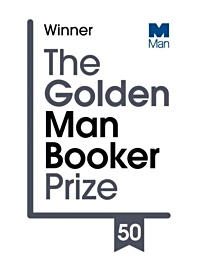 The English Patient by Michael Ondaatje (Bloomsbury) has been crowned the best work of fiction from the last five decades of the Man Booker Prize. The Golden Man Booker winner was revealed at the Man Booker 50 Festival in Royal Festival Hall at Southbank Centre.
The English Patient by Michael Ondaatje (Bloomsbury) has been crowned the best work of fiction from the last five decades of the Man Booker Prize. The Golden Man Booker winner was revealed at the Man Booker 50 Festival in Royal Festival Hall at Southbank Centre.
The winner of this special one-off award for the Man Booker Prize’s 50th anniversary celebrations was chosen by the public.
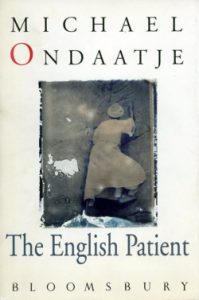 The Golden Man Booker Prize, a special one-off award to celebrate the 50th anniversary in 2018, crowns the best work of fiction from the last five decades of the prize, as chosen by five judges and then voted for by the public.
The Golden Man Booker Prize, a special one-off award to celebrate the 50th anniversary in 2018, crowns the best work of fiction from the last five decades of the prize, as chosen by five judges and then voted for by the public.
The English Patient by Michael Ondaatje is set in 1945.
The English Patient explores the lives of four very disparate war torn people, a young woman and three men, who take refuge in a damaged villa north of Florence as the war retreats around them.
In an upstairs room lies the badly burned English patient, alive but unable to move. His extraordinary adventures and turbulent love affair in the North African desert before the war provide the focus around which the vivid tales of his companions revolve.
His very presence will forever change the destiny of those around him.
The Golden Man Booker Prize 2018
fleursdumal.nl magazine
More in: - Book Lovers, - Book News, Archive O-P, Art & Literature News, Awards & Prizes
Tatiana du Plessix, the wife of a French diplomat, was a beautiful, sophisticated “white Russian” who had been the muse of the famous Russian poet Vladimir Mayakovsky.
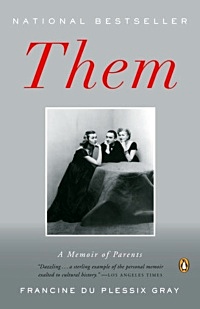 Alexander Liberman, the ambitious son of a prominent Russian Jew, was a gifted magazine editor and aspiring artist. As part of the progressive artistic Russian émigré community living in Paris in the 1930s, the two were destined to meet. They began a passionate affair, and the year after Paris was occupied in World War II they fled to New York with Tatiana’s young daughter, Francine.
Alexander Liberman, the ambitious son of a prominent Russian Jew, was a gifted magazine editor and aspiring artist. As part of the progressive artistic Russian émigré community living in Paris in the 1930s, the two were destined to meet. They began a passionate affair, and the year after Paris was occupied in World War II they fled to New York with Tatiana’s young daughter, Francine.
There they determinedly rose to the top of high society, holding court to a Who’s Who list of the midcentury’s intellectuals and entertainers. Flamboyant and outrageous, bold and brilliant, they were irresistible to friends like Marlene Dietrich, Salvador Dalí, and the publishing tycoon Condé Nast. But to those who knew them well they were also highly neurotic, narcissistic, and glacially self-promoting, prone to cut out of their lives, with surgical precision, close friends who were no longer of use to them.
Tatiana became an icon of New York fashion, and the hats she designed for Saks Fifth Avenue were de rigueur for stylish women everywhere. Alexander Liberman, who devotedly raised Francine as his own child from the time she was nine, eventually came to preside over the entire Condé Nast empire. The glamorous life they shared was both creative and destructive and was marked by an exceptional bond forged out of their highly charged love and raging self-centeredness. Their obsessive adulation of success and elegance was elevated to a kind of worship, and the high drama that characterized their lives followed them to their deaths. Tatiana, increasingly consumed with nostalgia for a long-lost Russia, spent her last years addicted to painkillers. Shortly after her death, Alexander, then age eighty, shocked all who knew him by marrying her nurse.
Them: A Portrait of Parents is a beautifully written homage to the extraordinary lives of two fascinating, irrepressible people who were larger than life emblems of a bygone age. Written with honesty and grace by the person who knew them best, this generational saga is a survivor’s story. Tatiana and Alexander survived the Russian Revolution, the fall of France, and New York’s factory of fame. Their daughter, Francine, survived them.
Francine du Plessix Gray is a regular contributor to The New Yorker and the author of numerous essays and books, including Simone Weil, At Home with the Marquis de Sade: A Life, Rage and Fire, Lovers and Tyrants, and Soviet Women. She lives with her husband, the painter Cleve Gray.
Francine Du Plessix Gray
Them
A Memoir of Parents
Paperback
$18.00
Penguin Books
2006
544 Pages
ISBN 9780143037194
books
fleursdumal.nl magazine
More in: - Book News, - Book Stories, Archive O-P, Majakovsky, Vladimir
Afke slaat een arm om zijn schouders en geeft hem een kus. Achter haar staat Zhia, haar vriendin, met dat altijd glinsterende lachje.
 `Zat je weer te fantaseren, opa?’
`Zat je weer te fantaseren, opa?’
`Ik denk graag terug aan de tijd waarin ik net zo oud was als jij.’
`Ik ben bijna dertien.’
`Pas maar op. Het dertiende jaar is het jaar van de ongelukken. In dat jaar moet je heel voorzichtig zijn, beloof je me dat?’
`Ja, maar waarom?’
`Als kinderen dertien zijn worden ze roekeloos. Omdat ze geen kind meer willen zijn, maar ze horen nog lang niet bij de volwassenen.’
`Volgens Afke weet u alles over China’, zegt Zhia.
`Jullie mogen mijn boeken lezen.’
`Het is leuker als u erover vertelt.’
`Kennen jullie het verhaal over het meisje dat elke dag water moest halen? Lotusbloem?’
`Heten alle meisjes in China Lotusbloem? Vorige keer, in het verhaal over het meisje met de tijger, heette ze ook Lotusbloem.’
`Ik weet het. Ze redde de tijger van de jagers en toen bleek hij een koningszoon te zijn. Maar deze Lotusbloem is anders. Elke ochtend heel vroeg, in zomer en winter, nog voor de anderen in huis wakker waren, moest zij water halen, heel ver bij de rivier. Twee volle emmers. Elke ochtend beklaagde Lotusbloem zich, want ze voelde zich als werkezel gebruikt. En soms, als ze thuis veel water nodig hadden voor de was, liep ze al die kilometers twee of drie keer per dag. Tot ze er doodmoe bij neerviel.
Op een ochtend, toen ze bijna thuis was met de volle emmers, kwam ze een oude man op een paard tegen.
“Mag ik wat water van je?” vroeg hij. Lotusbloem zag dat de man erg dorstig was en liet hem drinken.
“Mag mijn paard ook drinken?” Het meisje zag dat het paard ook dorst had en streek over haar hart. Het paard dronk beide emmers leeg.
De ruiter bedankte haar en reed weg. Lotusbloem moest de hele weg weer terug naar de rivier. Toen ze eindelijk thuiskwam met de volle emmers kreeg ze slaag omdat ze zo lang was weggebleven.
De volgende ochtend gebeurde hetzelfde. Weer ontmoette ze de oude man op het paard, vlak voordat ze met haar volle emmers thuis was. En weer vroeg hij om hem en zijn paard te laten drinken. Hoewel ze besefte dat ze weer slaag zou krijgen, liet Lotusbloem beiden toch drinken. Weer waren de emmers leeg.
“Je bent een goed meisje”, zei de man. “Als dank geef ik je dit zweepje. Dat zorgt ervoor dat je nooit meer water hoeft te halen. Leg het thuis in de waterton en ze zal altijd tot de rand gevuld zijn. Maar je mag het zweepje nooit uit de ton halen, beloof je dat?”
“Dat beloof ik”, zei het meisje.
Opeens waren paard en ruiter verdwenen.
Verbaasd, maar ook nieuwsgierig, ging Lotusbloem naar huis en legde het zweepje in de lege waterton. Direct vulde de ton zich met helder water. En hoeveel water ze ook uit de ton haalde, ze bleef tot aan de rand gevuld.
Thuis vertelde ze wat er was gebeurd en dat ze het zweepje van de oude man had gekregen, maar ook dat het nooit uit de ton gehaald mocht worden.
Vanaf die dag was er altijd zo veel water dat niemand uit het dorp nog de verre weg naar de rivier hoefde te gaan. En iedereen was blij met Lotusbloem. Alleen haar moeder niet. Ze zag dat Lotusbloem meer geliefd was dan zij omdat haar dochter door haar goedheid de mensen van een zware last had bevrijd. Op zekere dag kon de moeder dat niet meer verdragen. Ze haalde het zweepje uit de ton en gooide het weg. Direct stroomde de ton over en een massa water spoelde door het dorp. De vloed nam de moeder mee naar de rivier, waar ze verdronk.
De ton bleef overstromen en een steeds bredere stroom spoelde door het dorp. Ten slotte stond het hele dorp blank. De mensen waren in paniek. Lotusbloem besefte wat er was gebeurd. Omdat ze niets anders had, deed ze haar hoofddoekje af en gooide het in de woeste stroom. Direct viel de vloed stil. Het water dat uit de ton bleef vloeien, versmalde tot een smalle beek.
De mensen waren blij. De woeste stroom was verdwenen, maar ze hadden nog steeds een bron die genoeg water gaf voor het hele dorp. Ze wilden Lotusbloem bedanken, maar ze konden haar niet meer vinden. Daarom lieten ze een beeld van haar maken, dat ze bij de bron plaatsten, om haar voor altijd in hun midden te hebben.’
`Een mooi verhaal’, zegt Afke.
`In mijn boekenkast vind je er honderden.’
`Na school komen we naar jou’, belooft Afke. `Ik wil een paar boeken uitzoeken.’
Ton van Reen: Het diepste blauw (062)
wordt vervolgd
fleursdumal.nl magazine
More in: - Book Stories, - Het diepste blauw, Archive Q-R, Reen, Ton van
Thank you for reading Fleurs du Mal - magazine for art & literature